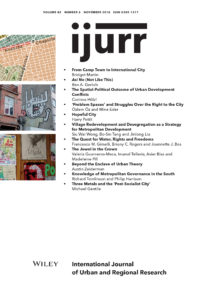Contemporary forms of ‘world‐class’ or ‘global’ city making have displaced, excluded and imperilled millions of urban inhabitants across the global South. This article departs from conventional approaches in urban geography to understanding the relationship ‘global cities’ forge with those inhabitants, which focus on the displacement, resistance and inventive survival of the poor within the ‘informal city’. Instead, it highlights more interstitial and less combative experiences. First, it explicates the presence of a group of Egyptians stripped of their ability to forge a middle‐class life in the context of Cairo’s ‘global city’ project. Thereafter, rather than focusing on their propensity to engage in political mobilization—a dominant trend after Egypt’s 2011 Uprising—the article utilizes 11 months of ethnographic fieldwork to argue that Cairo’s ‘global’ city offers up a semblance of inclusion to this excluded group. By extending a meritocratic promise that ‘global’ belonging is achievable through hard work, it keeps aspirational young men attached to a feeling of hope. The article therefore shows not how ‘global’ or ‘world‐class’ urban projects induce the resistance of wider urban populations, but how they secure legitimacy.

